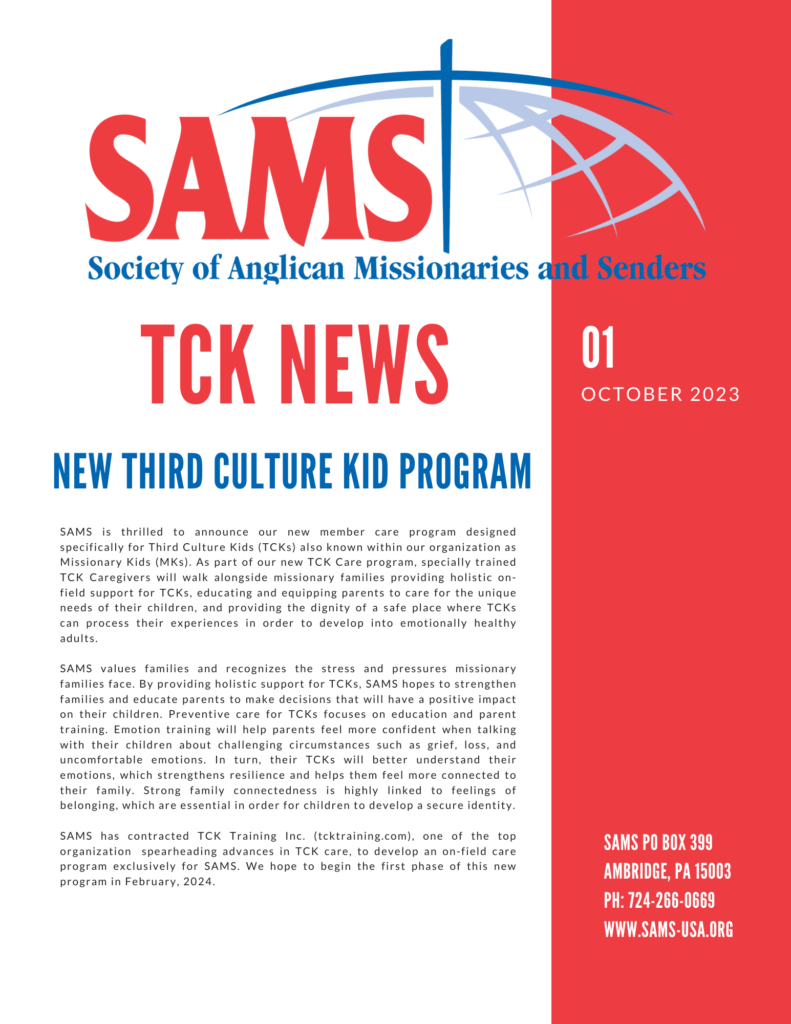
by Brendan Kimbrough | Aug 30, 2024 | SAMS Missionaries
by Mary McDonald
Originally posted August 2, 2024, Anglican Compass
A Biblical Mandate for Creation Care
And God blessed them. And God said to them, “Be fruitful and multiply and fill the earth and subdue it and have dominion over the fish of the sea and over the birds of the heavens and over every living thing that moves on the earth.
Genesis 1:28”
In his first commission to us in Genesis 1, God gave us two interconnected orders. The first was to be fruitful and multiply. We have done quite well with that part, with our world population now over eight billion. The second was to rule over and tend to his creation. We don’t often do as well with that one. However, the Church has an opportunity to lead the way in stewarding creation and, in doing so, point others to their Creator.
Read more…

by Brendan Kimbrough | Apr 11, 2024 | SAMS Missionaries, Third Culture Kids (TCK)
Raising children in the mission field can present some challenges to missionary parents and their children. Many missionaries are not always fully aware that other missionaries and SAMS as a sending Society desires to walk alongside families with pastoral sensitivity, a listening ear, and loving support.
SAMS Missionaries, Kim Miller and her husband Mike, encountered some of these challenges with their children upon their return from Honduras. Kim felt called to develop a TCK Care Program. Her aim is to raise awareness of Third Culture Kids issues and give SAMS families much-needed resources and care.
She recognizes many of the strengths of missionary kids such as a lifelong interest in learning about new cultures and the ability to quickly acquire social skills. Open-mindedness and interpersonal styles based on respect and empathy are typical of third culture children, as is autonomy and the disposition to help others. However, children of missionaries also experience things that are unique to their lives within a cross-cultural context that require care that is appropriate and focused on them.
Kim has partnered with industry-leader TCK Training to bring about a new program for SAMS designed to minister to SAMS families with children. The program has three main components which include Family Care, TCK Direct Care, and Child Safeguarding.
The Family Care portion of TCK Care involves family check-ins designed to proactively reach out to SAMS families to ask questions about how they are doing in a non-intrusive way. The goal is for families to be loved and supported and for parents to be ministered to when it comes to their children.
Kim can also help families with a support plan if parents are seeing a lack of resiliency in their children and even assist to help prevent crises from occurring through preventative care. Part of family care also includes life-change updates which may occur, for example, with births in the family, or family deaths, or larger life events like major upcoming moves. Families find that caring support through these life events makes a real difference. A TCK newsletter produced by Kim will also be made available to families.
The second component is directed care to the children called TCK Direct Care. This care is age-appropriate from age 4 and up. Research has shown that many missionary children experience mental health issues as adults from unresolved problems that occurred during childhood. Kim can provide a safe space for kids to express some of the difficult things they experience living cross-culturally and process their emotions.
The last component of TCK Care is Child Safeguarding. This component defines guidelines for SAMs staff and personnel in the event of a child safety issue. The guidelines cover anyone going to visit missionaries and their children, and personnel interacting with missionary kids. The guidelines contextualize the unique needs of TCK children with sensitivity to their lives. The guidelines are also for parents in helping identify things that parents can look for and communicate to TCK caregivers.
In tandem with these care initiatives, an overriding concern for missionary parents is education of their kids. The ability to connect parents with the right educational resources is crucial. This is already being done by parents and for some it is straightforward, but for some the burden of educating their children and navigating their needs is not, particularly in a cross-cultural setting. The TCK Care Program can help support families educationally.
TCK education directed to parents empowers and trains parents to learn some of the preventive steps that can be used with their kids by encouraging them to learn the language of emotion and encouraging their children to express themselves and talk about hard things in healthy ways. The idea is to teach parents to train their children to talk about both good things as well as difficult things as a way to process grief and loss in healthy ways.
One last emphasis for TCK Care is to help SAMS Missisonary kids feel more connected to SAMS as an organization. Kim Miller is working with SAMS personnel to make this happen. Sometimes the parents have a stronger sense of SAMS, but the children are a step further removed. Kim plans to roll out some very intentional ways for SAMS kids to develop community among one another as well as at some of the larger SAMS events.
Kim encourages parents with questions to reach out to her with questions.
Kim Miller
SAMS Children’s Ministry, Missionary
KimMiller@sams-usa.org

by Brendan Kimbrough | Apr 7, 2024 | SAMS Missionaries
by Heidi Smith, SAMS Missionary to Chile
Twenty-nine years ago, I met a young woman named Carla at the beginning of the new school term. Carla happened to be our son Joshua’s new kindergarten teacher. We were living in Villa Alemana, Chile, where my husband Russ was serving as pastor of San Esteban, the Anglican parish there. I would often see Carla at school and it wasn’t long before I discovered that she was a ‘disillusioned Mormon.’
As Carla related some of her story to me it was clear she was struggling. She had left the Mormonism of her childhood because of the inconsistencies she had witnessed – people saying one thing but doing another. She clung to the idea that if you could be perfect, or at least look perfect, you would be ok. Appearances were everything to her.

Carla with Kindergarten Class in Villa Alemana
One day I invited her to our ladies’ group and she seemed to really enjoy it, especially when we talked about God, about answer to prayer, and about the difference Jesus could make in your life. Later on, Carla had told me that our ladies’ group had reminded her of her Pentecostal grandmother whose robust faith she had seen firsthand when living with her during college. Her grandmother had impressed upon her how real her faith was to her. Her grandmother had never stopped praying that one day God would bring Carla out of Mormonism and bring her to Christ.
Soon afterward Carla asked to meet with me to talk one-on-one. When we met, I had the chance to share the Gospel with her. “But,” Carla objected, “God can’t accept me because I am not perfect.” “None of us is,” I told her, and she insisted that I was. I explained to her that that was definitely not the case!
I told her, “The only perfect one is Jesus, and He died to take the punishment we deserve for our sins. His death makes it possible for us to be forgiven and to come into a relationship with God through Him…. would you like to receive Jesus into your life?” She said, “Yes, I would.” As she began to pray, she acknowledged her sin and asked Jesus to come into her life. She told Him that she renounced anything she had been taught in the Mormon church that did not agree with God’s truth. That was the beginning for Carla.
She started coming to church and doing Bible study and growing in her faith. The church family received her with open arms as a single mom. A few years later, God blessed Carla with a husband, a Christian musician named Pablo who loved her and her little son, married her, and received 3-year old Andres as his son. Soon after, little Daniela came along.
A few years later, we moved from Villa Alemana to a city 500 miles to the south. Carla, Pablo, and their kids moved 1000 miles to the north when Pablo found work in the mining industry. Carla was able to find an even better teaching position there. Now we were separated by 1500 miles, and other than seeing each other’s news on Facebook, we didn’t have much contact for more than a decade.
Ironically, it was the COVID pandemic that brought us together again. Chile was very locked down. Gatherings of any kind were prohibited including church services for over a year and a half. Zoom meetings became the way to connect, and we reached out to people we had known over the years who we thought might be interested in joining us for an online prayer, worship and, study.
Carla joined the nightly women’s prayer meetings and once again we were involved in each other’s lives. It was an amazing time, but not without difficulties. Carla went through what she later described as “a huge storm in my life.” She told me that she would not have made it had it not been for the support of our nightly prayer group. By God’s grace she did persevere, and a new chapter in her life had begun.
As the pandemic ended the Prayer Group began meeting weekly. The relationships forged during those months were too strong to just let go. Last October, at one of our weekly prayer times, I announced to the group that Russ and I would be traveling to the U.S. for our bi-annual time of visiting supporting churches.
Out of the blue, Carla piped up, “I want to go with you.” “Right,” I replied jokingly, “Just hop in my suitcase and you can come.” But Carla wasn’t joking. She not only wanted to come, she believed that God wanted her to come. As the days went by, I realized she was serious. I spoke to Russ about it because in all of our 37 years in Chile, we had never had someone from Chile join us on our home assignment. To my amazement, Russ thought it was an interesting idea.
I told Carla that our home assignment was not a vacation and there wouldn’t be much time for tourism. She had never even left Chile, much less visited the U.S. I asked her why she wanted to come. She said, “I want to go with you to visit the churches that support you. I want to see what you do.” I asked if she would be willing to share her story to which she responded with an enthusiastic “YES!”

Heidi and Carla at O’Hare Airport
Everything came together, as it does when God is in it, and on a record-breaking frigid night of -22 degrees in Chicago, Carla arrived at O’Hare airport. Twelve hours later, she was by our side, sharing her story in the church we were visiting that morning. She got choked up as she read it. (She had it written down to be sure she got the English right.) I put my arm around her and got teary too. And then I noticed that people in the congregation were tearing up. Afterwards, people came up to her and told her how her story had touched them.
Besides talking about how she had met us 29 years ago, Carla included the following in the story she shared with 10 groups of people over the next 17 days she was with us:
Russ and Heidi gave me a beautiful testimony of Jesus. They taught me about a loving God. I didn’t have to be perfect for God. And that was amazing for me!! I learned that God loved me just as I am and that Jesus had died for me. They invited me to meet this God of love and hope. They shared their light and joy with me.
And so, one day when I met with Heidi, I asked Jesus to come into my life. I came to understand that God has a purpose for my life, and I told myself with great conviction in my heart: Surrender! Stop fighting! Surrender to Jesus! And so, I did. On that day I took the step, the step of faith. I started to live just one day at a time. I felt His hope renew me daily. Recently I have had to go through a great storm in my life and definitely… I am not the same. I started having a plan, a little plan, making every day count. Having a daily purpose, just a small purpose, and little by little I have begun to advance because I’m not alone. Finally, I understand I can’t go back and change the beginning, but I can start from where I am and change the ending because God is with me. Over the years, I have shared my faith with others. I too have invited people to meet Jesus.
I thank God that one day Russ and Heidi decided to begin this walk as missionaries, and that that decision was a life-long one, because their testimony changed my life forever. I love them with all my heart.

Carla with Heidi and Russ sharing her testimony to the congregation
It seems there were words of truth and encouragement in her story for many people to hear. God brought her with us as the “good fruit” of our ministry in Chile all of these years, as well as to be an ambassador for Him. It’s a testimony of how He can bring light out of darkness. And about when we go through “a great storm,” God does not abandon us. Our Way Maker is making a way for us to encounter Him and others. “Even when we can’t see it, He’s working. Even when we can’t feel it, He’s working,” and as the words of that song say. “He never stops, never stops working.”










